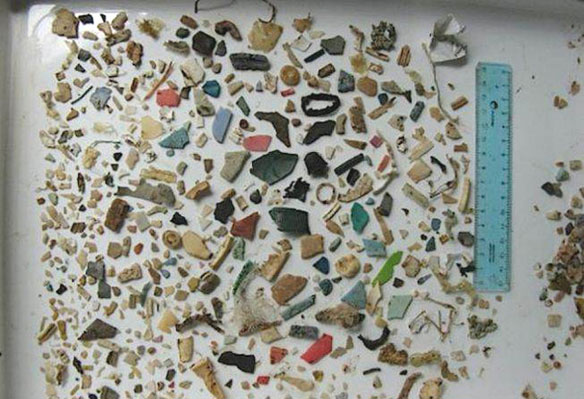
Photo source: ©© Anna Hesser
Excerpts;
Sea turtles around the world are eating plastic at an unprecedented pace, a new study reveals, with some species downing twice as much as they did 25 years ago.
This indigestible, potentially fatal diet is especially popular among young turtles in the open ocean, deepening concerns about the ancient animals’ long-term outlook.
Original Study: Global Analysis of Anthropogenic Debris Ingestion by Sea Turtles, Conservation Biology
Abstract:
Ingestion of marine debris can have lethal and sublethal effects on sea turtles and other wildlife. Although researchers have reported on ingestion of anthropogenic debris by marine turtles and implied incidences of debris ingestion have increased over time, there has not been a global synthesis of the phenomenon since 1985. Thus, we analyzed 37 studies published from 1985 to 2012 that report on data collected from before 1900 through 2011. Specifically, we investigated whether ingestion prevalence has changed over time, what types of debris are most commonly ingested, the geographic distribution of debris ingestion by marine turtles relative to global debris distribution, and which species and life-history stages are most likely to ingest debris. The probability of green (Chelonia mydas) and leatherback turtles (Dermochelys coriacea) ingesting debris increased significantly over time, and plastic was the most commonly ingested debris. Turtles in nearly all regions studied ingest debris, but the probability of ingestion was not related to modeled debris densities. Furthermore, smaller, oceanic-stage turtles were more likely to ingest debris than coastal foragers, whereas carnivorous species were less likely to ingest debris than herbivores or gelatinovores. Our results indicate oceanic leatherback turtles and green turtles are at the greatest risk of both lethal and sublethal effects from ingested marine debris. To reduce this risk, anthropogenic debris must be managed at a global level.
The Plastic Found In a Single Turtle’s Stomach, Independent UK (Uploaded 03-24-2011)
Message From The Gyre, Midway Atoll, by ©Chris Jordan
An image courtesy of Chris Jordan, from the Midway Series, for Coastal Care.
Plastic Pollution: When The Mermaids Cry: The Great Plastic Tide, Coastal Care
Sea Turtle Egg Poaching Legalized in Costa Rica: The Debate, Coastal Care

The debris from the stomach of a green sea turtle. This collection of hundreds of coloured, jagged shards could be a work of abstract art. But the objects in the photograph are the contents of the stomach of a sea turtle, found off the coast of Argentina, that lost its battle with plastic pollution…Captions and image source: Independent UK








